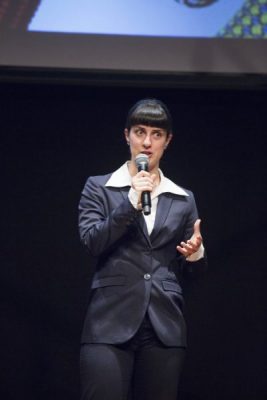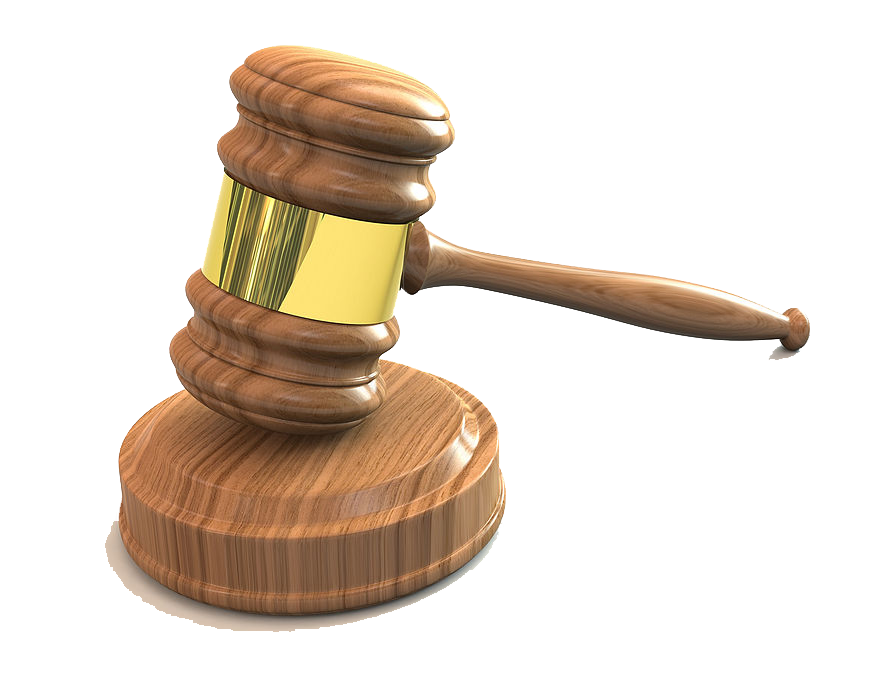This post is also available in Dutch.
Here, you can read the fictional story of a researcher accused of fraud. Please vote: is she innocent or guilty?
As part of a competition called in’to Stories organized by Radboud in’to Languages, I wrote a monologue given by a fictional character, a post-doc in a scientific integrity dilemma. Under a great deal of pressure to publish high-impact papers, she had cherry-picked her data and not reported the whole truth about her results. Because of this, the post-doc in question had been accused of fraud and was facing a trial. She delivers her monologue to a jury that will decide whether she is innocent or guilty of fraud.

This is me delivering the monologue at in’to Stories, apparently deep into my performance.
Image credits: Radboud in’to Languages
I don’t know what the correct answer is. I don’t know if a person in a questionable ethical situation is innocent or guilty, but it’s worthwhile to ask the question and to think about it together. That’s why I’d like to ask you: Is the person in question innocent or guilty? What’s your verdict?
Read the monologue below and leave your verdict in a comment
Dear Committee on Scientific Integrity,
My name is Jane Smith, a post-doctoral researcher at the Brook Academy of Sciences. I stand before you today to explain my perspective on my recent involvement in questionable research practices.
Let me explain everything from the beginning. I am a 41-year-old woman, married, with two children. This is my fourth post-doctoral position, and my family has moved with me three times so far because of my job. They cannot wait to settle down in one place. I have applied to several permanent positions so far, unsuccessfully. Clearly, I am under a great deal of pressure to find a permanent position, and this is notoriously difficult in the field of academia. In order to give my career a boost, I focused on getting a high-quality publication.
I came up with a project that was thrilling: the experiment was going to examine a question that had been debated for years, and because the design was so cunning, I thought it would make a remarkable contribution to science. I hoped that the finding would be published in a high-impact journal, and this would be hugely beneficial for my career.
Can you imagine how excited I was to see the results once the data were collected? I rolled up my sleeves and applied the analysis I had in mind. I was crushed: the difference I was looking for was not significant. But this was so important to me that I could not give up! I applied many other analysis methods, and one of them, a single one, showed a significant difference! Finally, I could write my paper! After some hard work, my dream paper was published in a high-impact journal.
At a conference, a fellow researcher asked me why I had not used another method of analysis. In the spirit of honesty, I responded that I had used it, but it had yielded an insignificant result. That sparked an argument between us, and others joined the discussion. Soon I was surrounded by people accusing me of committing fraud because I had not reported the whole truth but only a snippet of it.
I did not know how to respond to these accusations. It was true that I had not reported the whole truth, and I felt guilty about that. But did that make me a fraud? Most scientists do this. We pick the most informative outcome and draw conclusions based on that. We do this because journal editors encourage us to tell a clear story about our data, like a straight line from research question to outcome. We need to come up with a simple explanation about our data in order to have high-quality publications. And it is high-quality publications that make us successful scientists, which allows us to live good lives and provide for our families.
This leads to a problem. Can you guess what that is? The problem is that the world is not simple and straightforward, but scientists are forced to portray it as such. Reality is a complex agglomeration of patterns that doesn’t fit simple hypotheses and straightforward theories. If the goal of science is to understand the real world, then science needs to account for this complexity. Instead of trying to make a clear story of our data, we need to report everything: the clear, exciting outcomes as well as the strange, confusing, convoluted outcomes.
I don’t think I am a fraud because I am interested in learning the truth about the complex world we live in. I admit I engaged in practices that are questionable, but the majority of scientists also engage in them. This is not because we are all frauds but because we are required to do this to function well in academia. However, if we want science to reflect the truth about reality, we need to change the requirements of academia.
I hope you will hear my plea for change in academia. I believe it will help us to save our science as well as our scientists. And I hope you will see me not as a fraud but as one of many tormented scientists, searching for the right way to live and work.
Thank you very much.

Is Jane Smith innocent or guilty? Please vote in the comments below or vote here!
Image credits: Wikipedia (CC BY 4.0)
Vote here!
Written by Marisha. Edited by Monica.
